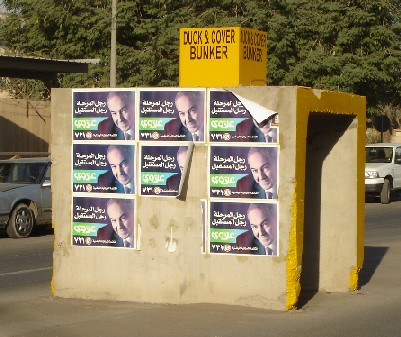Mood:
I have survived my one year tour in Iraq. I am going home today.
Posted by alohafromtim
at 1:34 AM EST
| « | January 2006 | » | ||||
| S | M | T | W | T | F | S |
| 1 | 2 | 3 | 4 | 5 | 6 | 7 |
| 8 | 9 | 10 | 11 | 12 | 13 | 14 |
| 15 | 16 | 17 | 18 | 19 | 20 | 21 |
| 22 | 23 | 24 | 25 | 26 | 27 | 28 |
| 29 | 30 | 31 | ||||
 Security. Almost every time that a dictatorship falls, a period of anarchy ensures. It happened in East Timor. It happened in the Congo. It happened in Iraq. Unfortunately, the military (or perhaps just senior Administration leaders) failed to plan for this highly enviable outcome. In fact, senior political leaders pushed people out of the way who questioned the plan or made comments that attacked the logical behind the basic plan.
Security. Almost every time that a dictatorship falls, a period of anarchy ensures. It happened in East Timor. It happened in the Congo. It happened in Iraq. Unfortunately, the military (or perhaps just senior Administration leaders) failed to plan for this highly enviable outcome. In fact, senior political leaders pushed people out of the way who questioned the plan or made comments that attacked the logical behind the basic plan.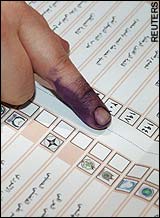 Politics. The typical American view is that the elections are like a magic wand that will produce peace and prosperity. This may be so, but Iraqi elections have yet to produce a viable, trustworthy government. Consider the El Salvador elections in 1982 that went off well in terms of numbers; their civil war there went on for another decade. Will that happen in Iraq? While the political process can bring an end to the violence, it won’t happen overnight even if it goes well.
Politics. The typical American view is that the elections are like a magic wand that will produce peace and prosperity. This may be so, but Iraqi elections have yet to produce a viable, trustworthy government. Consider the El Salvador elections in 1982 that went off well in terms of numbers; their civil war there went on for another decade. Will that happen in Iraq? While the political process can bring an end to the violence, it won’t happen overnight even if it goes well.
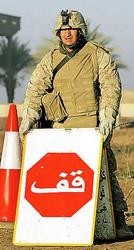 For nearly 12 months, every time I went from my compound to the Palace, I had to pass through a Marine checkpoint. During that time, I have seen the Marines beef up the checkpoint. At first it was simply a bunch of Marines who were supported by two machinegun nests perhaps 30 yards from the checkpoint. Then, they added speed bumps. Shortly after that, they added a lot of jersey barriers. Then, they added thick metal wires that could be used block off the road in an emergency.
For nearly 12 months, every time I went from my compound to the Palace, I had to pass through a Marine checkpoint. During that time, I have seen the Marines beef up the checkpoint. At first it was simply a bunch of Marines who were supported by two machinegun nests perhaps 30 yards from the checkpoint. Then, they added speed bumps. Shortly after that, they added a lot of jersey barriers. Then, they added thick metal wires that could be used block off the road in an emergency.
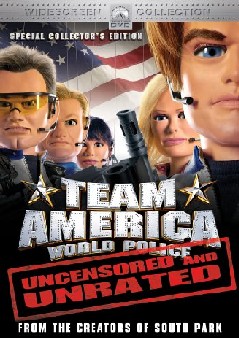 Marines in Anbar province refer to Iraqis as Dirka Dirkas. The reference comes from a film called Team America. The film, which was created by the duo that brought us South Park, has cheesy puppet that are sent throughout the globe to fight terrorism. It is a strong satire about American politics and Americans in general. In the film, most Arabs say things like "Dirka Dirka" rather than actual Arabic words.
Marines in Anbar province refer to Iraqis as Dirka Dirkas. The reference comes from a film called Team America. The film, which was created by the duo that brought us South Park, has cheesy puppet that are sent throughout the globe to fight terrorism. It is a strong satire about American politics and Americans in general. In the film, most Arabs say things like "Dirka Dirka" rather than actual Arabic words.
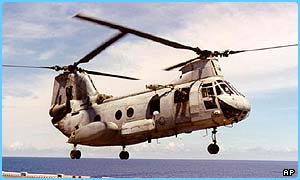 Although the Army is willing to fly helicopters during the day, the Marines have decided that the baddies have gotten too good at taking down helicopter to justify day movements. During a night movement, passengers sometimes doze off and it is nearly impossible for the passengers to know where they are at any particular time. Thus, passengers have their hands marked so the flight crew knows where to kick them off. The code for the Green Zone is "CP," which is short for Camp Prosperity - a base within the Green Zone.
Although the Army is willing to fly helicopters during the day, the Marines have decided that the baddies have gotten too good at taking down helicopter to justify day movements. During a night movement, passengers sometimes doze off and it is nearly impossible for the passengers to know where they are at any particular time. Thus, passengers have their hands marked so the flight crew knows where to kick them off. The code for the Green Zone is "CP," which is short for Camp Prosperity - a base within the Green Zone.
 Although PXs do accept credit cards, Americans posted to Iraq still need American dollars so they can purchase alcohol, souvenirs, hair cuts, food from the local economy, etc. Most people bring cash with them when the enter Iraq. (I was advised to bring $1,000 to cover my personal expenses while in Iraq.) However, it is surprising how quickly $1,000 will disappear when you are buying rugs or throwing big parties. That is why I am very thankful that there are other ways to pick up American dollars in Iraq.
Although PXs do accept credit cards, Americans posted to Iraq still need American dollars so they can purchase alcohol, souvenirs, hair cuts, food from the local economy, etc. Most people bring cash with them when the enter Iraq. (I was advised to bring $1,000 to cover my personal expenses while in Iraq.) However, it is surprising how quickly $1,000 will disappear when you are buying rugs or throwing big parties. That is why I am very thankful that there are other ways to pick up American dollars in Iraq.
 Yesterday, I was invited to a large Christmas party hosted by Aegis, a security company working in Iraq. I didn't go, which means I missed the only chance I had in Iraq to meet its infamous founder Tim Spicer.
Yesterday, I was invited to a large Christmas party hosted by Aegis, a security company working in Iraq. I didn't go, which means I missed the only chance I had in Iraq to meet its infamous founder Tim Spicer.
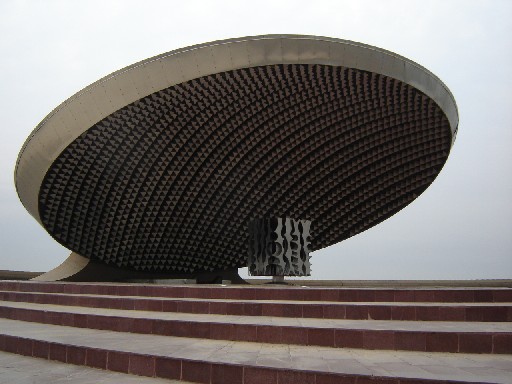
 In an effort to keep people working in the Green Zone entertained, KBR has created a small makeshift theater in the basement of the Place, the heart of the US embassy's operations in Baghdad. The theater holds about 30 to 40 people, who can sit in comfy seats that are slightly tiered. Most of the films are fairly modern, but occasionally they show older films if it fits into a theme. For example, right now the nice people from KBR are showing Christmas movies ranging the gamut from Bad Santa to It's a Wonderful Life.
In an effort to keep people working in the Green Zone entertained, KBR has created a small makeshift theater in the basement of the Place, the heart of the US embassy's operations in Baghdad. The theater holds about 30 to 40 people, who can sit in comfy seats that are slightly tiered. Most of the films are fairly modern, but occasionally they show older films if it fits into a theme. For example, right now the nice people from KBR are showing Christmas movies ranging the gamut from Bad Santa to It's a Wonderful Life.
